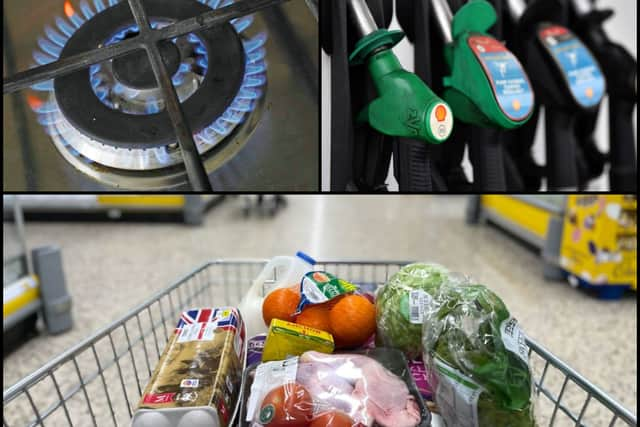Cost of living: Find out how much your council tax, car tax, energy bill and National Insurance are going up
and live on Freeview channel 276
Tax and price rises had been expected for some time, but the Russian invasion of Ukraine has meant that fuel and energy bills will be rising faster as well.
Petrol and diesel prices have hit new highs, and at a time when National Insurance, car tax, energy prices and council tax are due to go up.
Here’s a quick guide to when your bills are going up.
National Insurance
Advertisement
Hide AdAdvertisement
Hide AdIn 2022, National Insurance will go up to support the NHS and equivalent bodies across the UK as they deal with the backlog caused by Covid-19. In 2023, the rates will decrease back to current levels and a new Health and Social Care Levy will be introduced to help health and social care bodies.


Employees, employers and the self-employed will pay 1.25p more in the pound for National Insurance - and then the Health and Social Care Levy when that starts in 2023. This will be on top of the existing payments.
Those earning under £9568 a year will not have to pay National Insurance or the new levy. Those above state pension age will not have to pay the National Insurance rise, but will have to pay the levy.
£20,000 per year - £130 tax rise
£30,000 per year - £255 tax rise
£50,000 per year - £505 tax rise
£80,000 per year - £880 tax rise
£100,000 per year - £1130 tax rise
The rise in National Insurance contributions starts on April 6, 2022. The Health and Social Care Levy will take-over on April 6, 2023.
Advertisement
Hide AdAdvertisement
Hide AdHowever, there is a chance this might not go ahead. With other bills increasing, Prime Minister Boris Johnson has been urged to scrap plans for the NI rise.
Council tax
It was announced in February that Glasgow City Council would be increasing the council tax levels by three per cent, after its annual budget was agreed.
Lifting council tax will raise an extra £6.9m for the city, with the Band D charge increasing from £1,386 to £1,428.
This change will start in April.
Car tax
Vehicle Excise Duty (VED) - also known as car tax - is going up in April 2022.
Advertisement
Hide AdAdvertisement
Hide AdVED is made up of two taxes - the standard rate and the first year rate. The former is a flat rate for all vehicles, while the latter is based on the CO2 figures when the vehicle was built.
For vehicles that were built on or after April 1, 2017, the standard rate is going from £155 to £165.
However, the prices for the first year rates are going up by various amounts.
The first year rates for each CO2 emissions brackets are:
1 to 50 - £10
51 to 75 - £25
76 to 90 - £120
91 to 100 - £150
101 to 110 - £170
111 to 130 - £190
131 to 150 - £230
151 to 170 - £580
171 to 190 - £945
191 to 225 - £1420
226 to 255 - £2015
Over 255 - £2265.
For vehicles registered on or after March 1, 2001, the rates are also going up for the different bands.
The new rates for each band are:
A - £0
B - £20
C - £30
D - £135
E - £165
F - £180
G - £220
H - £265
I - £290
J - £330
K - £360
L - £615
M - £630
Energy bills
Advertisement
Hide AdAdvertisement
Hide AdGas and electricity bills could rise by up to 50% by the spring, Energy UK has warned and those fears were realised after Ofgem announced a 54% hike to energy price cap from April 2022.
Now the energy price cap, currently at £1277 a year - a rise from £1138 a year from October 2021 - will increase again to the tune of around £1900.
Comment Guidelines
National World encourages reader discussion on our stories. User feedback, insights and back-and-forth exchanges add a rich layer of context to reporting. Please review our Community Guidelines before commenting.
